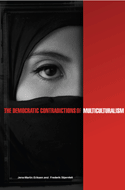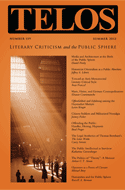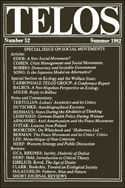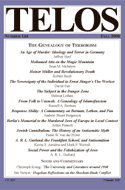By Telos Press · Friday, June 29, 2012 Jean Lassègue reviews Jens-Martin Eriksen and Frederik Stjernfelt’s The Democratic Contradictions of Multiculturalism, now available in English translation from Telos Press.
 The subject of Jens-Martin Eriksen and Frederik Stjernfelt’s book is the concept of multiculturalism and how it relates to organized religions conceived as purveyors of norms in the public sphere. If, in order to justify this approach, one were to draw a comparison with the famous analytical framework conceived by Karl Polanyi in The Great Transformation, which demonstrated that as from the second half of the 19th century, the economy had striven to absorb society instead of being governed by it, one might ask oneself if the question today is not whether religions are attempting the same endeavor, beyond the secular episode which slowly took shape in Europe until it prevailed in the 20th century, by trying to reverse society’s independence from any kind of external metaphysical foundation seeking to encompass it. From this standpoint, the examination of the relationships between Islam and multiculturalism takes up a significant part of the book, precisely because Islam is the only religion that to this day views its sphere of action as encompassing society and as including a proselytic component, an outlook which Christianity and Buddhism would (maybe temporarily) seem to have renounced. One can therefore readily understand the author’s chosen angle of approach, which bears for the most part on the place that should be afforded to organized religions, and especially to Islam, in the public sphere of liberal democracies at the highly specific point in their history where collective debate has progressively crystallized around the question of multiculturalism. The subject of Jens-Martin Eriksen and Frederik Stjernfelt’s book is the concept of multiculturalism and how it relates to organized religions conceived as purveyors of norms in the public sphere. If, in order to justify this approach, one were to draw a comparison with the famous analytical framework conceived by Karl Polanyi in The Great Transformation, which demonstrated that as from the second half of the 19th century, the economy had striven to absorb society instead of being governed by it, one might ask oneself if the question today is not whether religions are attempting the same endeavor, beyond the secular episode which slowly took shape in Europe until it prevailed in the 20th century, by trying to reverse society’s independence from any kind of external metaphysical foundation seeking to encompass it. From this standpoint, the examination of the relationships between Islam and multiculturalism takes up a significant part of the book, precisely because Islam is the only religion that to this day views its sphere of action as encompassing society and as including a proselytic component, an outlook which Christianity and Buddhism would (maybe temporarily) seem to have renounced. One can therefore readily understand the author’s chosen angle of approach, which bears for the most part on the place that should be afforded to organized religions, and especially to Islam, in the public sphere of liberal democracies at the highly specific point in their history where collective debate has progressively crystallized around the question of multiculturalism.
Continue reading →
By Eleanor Courtemanche · Thursday, June 28, 2012 Eleanor Courtemanche’s “Marx, Heine, and German Cosmopolitanism: The 1844 Deutsch-Französische Jahrbücher” appears in Telos 159 (Summer 2012). Read the full version online at the Telos Online website, or purchase a print copy of the issue here.
 This article argues that Marx’s economic cosmopolitanism was formulated, in part, as a response to the exiled radical poet Heinrich Heine’s satirical attacks on German nationalism. In Paris in 1844, the young journalist Marx collaborated with the revered Heine on the Deutsch-Französische Jahrbücher, which was meant to join German metaphysics and poetry with French socialist politics. Like Heine, Marx was a secular Jew from the border region of the Rhineland who saw French revolutionary politics as Germany’s inevitable destiny. While Heine wrestles with nostalgia for a backwards Prussia in Deutschland: Ein Wintermärchen (published in Vorwärts! in 1844), Marx’s “Critique of Hegel’s Philosophy of Law” argues that Germany must accomplish a difficult backwards somersault (“salto mortale“) over the dialectical boundary of the Rhine to transcend the impasses of French politics and British industrialism. Both Heine and Marx transformed their critique of Prussian autocracy into a more generalized cosmopolitan radicalism, though Heine’s aestheticism is sometimes confounding to Marxist critics. Meanwhile Marx’s engagement with the German tradition of Nationalökonomie is complex: while he critiques the Prussian nationalist use of free trade theories, the internationalism of his economic vision brings him closer to the British classical tradition of Smith and Ricardo than to German romantic protectionists like Friedrich List. This article argues that Marx’s economic cosmopolitanism was formulated, in part, as a response to the exiled radical poet Heinrich Heine’s satirical attacks on German nationalism. In Paris in 1844, the young journalist Marx collaborated with the revered Heine on the Deutsch-Französische Jahrbücher, which was meant to join German metaphysics and poetry with French socialist politics. Like Heine, Marx was a secular Jew from the border region of the Rhineland who saw French revolutionary politics as Germany’s inevitable destiny. While Heine wrestles with nostalgia for a backwards Prussia in Deutschland: Ein Wintermärchen (published in Vorwärts! in 1844), Marx’s “Critique of Hegel’s Philosophy of Law” argues that Germany must accomplish a difficult backwards somersault (“salto mortale“) over the dialectical boundary of the Rhine to transcend the impasses of French politics and British industrialism. Both Heine and Marx transformed their critique of Prussian autocracy into a more generalized cosmopolitan radicalism, though Heine’s aestheticism is sometimes confounding to Marxist critics. Meanwhile Marx’s engagement with the German tradition of Nationalökonomie is complex: while he critiques the Prussian nationalist use of free trade theories, the internationalism of his economic vision brings him closer to the British classical tradition of Smith and Ricardo than to German romantic protectionists like Friedrich List.
Continue reading →
By Michael Bray · Monday, June 25, 2012 Michael Bray’s “Openness as a Form of Closure: Public Sphere, Social Class and Alexander Kluge’s Counterproducts” appears in Telos 159 (Summer 2012). Read the full version online at the Telos Online website, or purchase a print copy of the issue here.
 This essay analyzes the seductions and impasses of the “openness” of public sphere theory in class society. It does so by sidestepping the more obvious limits of formal-discursive models of publicity and critically engaging with the theory and practice of Alexander Kluge, whose foundational work with Oskar Negt, Public Sphere and Experience, continues to ground experiential and affective models. For Kluge, this experiential turn was necessitated by the classist exclusions rationalist forms of publicity enact and it also made clear the need for “counterproducts” (rather than theoretical accounts) to combat audiovisual pseudo-publicity and construct a “proletariat public sphere.” Drawing together Kluge and Negt’s compelling account of exclusion and the specific character of Kluge’s own film and television counterproducts, shows how the latter fail to answer to the concerns the former, and helps explain the peculiar substitution, in Kluge’s films, of “feminine labor” and protagonists for the proletariat. This substitution, I suggest, is paradigmatic for the continuing shift of the “new left” away from issues of class. In closing, I propose the potential of a “populist public sphere” to more adequately address both the exclusions diagnosed by Kluge and Negt and the issues of gender “ciphered” in Kluge’s films. This essay analyzes the seductions and impasses of the “openness” of public sphere theory in class society. It does so by sidestepping the more obvious limits of formal-discursive models of publicity and critically engaging with the theory and practice of Alexander Kluge, whose foundational work with Oskar Negt, Public Sphere and Experience, continues to ground experiential and affective models. For Kluge, this experiential turn was necessitated by the classist exclusions rationalist forms of publicity enact and it also made clear the need for “counterproducts” (rather than theoretical accounts) to combat audiovisual pseudo-publicity and construct a “proletariat public sphere.” Drawing together Kluge and Negt’s compelling account of exclusion and the specific character of Kluge’s own film and television counterproducts, shows how the latter fail to answer to the concerns the former, and helps explain the peculiar substitution, in Kluge’s films, of “feminine labor” and protagonists for the proletariat. This substitution, I suggest, is paradigmatic for the continuing shift of the “new left” away from issues of class. In closing, I propose the potential of a “populist public sphere” to more adequately address both the exclusions diagnosed by Kluge and Negt and the issues of gender “ciphered” in Kluge’s films.
Continue reading →
By Wes Tirey · Thursday, June 21, 2012 As an occasional feature on TELOSscope, we highlight a past Telos article whose critical insights continue to illuminate our thinking and challenge our assumptions. Today, Wes Tirey looks at Norberto Bobbio’s ” Democracy and Invisible Government,” from Telos 52 (Summer 1982).
 “Democracy,” writes Jacques Rancière in Hatred of Democracy, “first of all means this: ‘anarchic government,’ one based on nothing other than the absence of every title to govern.” He adds: “Democracy is . . . the primary limitation of the power of forms of authority that govern the social body.” While Rancière’s suggestion that democracy is ‘anarchic government’ indeed seems paradoxical, and by all means requires careful unpacking, one thing that can be taken from it is that democracy is to be seen. That is to say, a political regime that requires active citizen-participation in which the body politic is self-governing requires political activity to therefore be made public. “Democracy,” writes Jacques Rancière in Hatred of Democracy, “first of all means this: ‘anarchic government,’ one based on nothing other than the absence of every title to govern.” He adds: “Democracy is . . . the primary limitation of the power of forms of authority that govern the social body.” While Rancière’s suggestion that democracy is ‘anarchic government’ indeed seems paradoxical, and by all means requires careful unpacking, one thing that can be taken from it is that democracy is to be seen. That is to say, a political regime that requires active citizen-participation in which the body politic is self-governing requires political activity to therefore be made public.
Continue reading →
By Katherine McGinity · Wednesday, June 20, 2012 As an occasional feature on TELOSscope, we highlight a past Telos article whose critical insights continue to illuminate our thinking and challenge our assumptions. Today, Katherine McGinity looks at Jim Vernon’s “American Antigone: Hegelian Reflections on the Sheehan-Bush Conflict,” from Telos 144 (Fall 2008).
 With the departure of the last American troops from Iraq, we can shift our perspective on the war from current event to one of history. Jim Vernon’s 2008 article “American Antigone: Hegelian Reflections on the Sheehan-Bush Conflict” was written in the midst of the war and just as Cindy Sheehan was moving herself out of the public eye. Now is an interesting time to revisit the dramatic conflict that ensued between Sheehan and George W. Bush and the ideological camps that formed around them. With the departure of the last American troops from Iraq, we can shift our perspective on the war from current event to one of history. Jim Vernon’s 2008 article “American Antigone: Hegelian Reflections on the Sheehan-Bush Conflict” was written in the midst of the war and just as Cindy Sheehan was moving herself out of the public eye. Now is an interesting time to revisit the dramatic conflict that ensued between Sheehan and George W. Bush and the ideological camps that formed around them.
Continue reading →
By Wes Tirey · Tuesday, June 19, 2012 The cover of the most recent issue of The Economist reads: “Morals and the machine: Teaching robots right from wrong.” A short piece in the magazine states: “As robots become more autonomous, the notion of computer-controlled machines facing ethical decisions is moving out of the realm of science fiction and into the real world. Society needs to find ways to ensure that they are better equipped to make moral judgments.” Moreover, as robots “become smarter and more widespread, autonomous machines are bound to end up making life-or-death decisions in unpredictable situations, thus assuming—or at least appearing to assume—moral agency.”
Continue reading →
|
|
 The subject of Jens-Martin Eriksen and Frederik Stjernfelt’s book is the concept of multiculturalism and how it relates to organized religions conceived as purveyors of norms in the public sphere. If, in order to justify this approach, one were to draw a comparison with the famous analytical framework conceived by Karl Polanyi in The Great Transformation, which demonstrated that as from the second half of the 19th century, the economy had striven to absorb society instead of being governed by it, one might ask oneself if the question today is not whether religions are attempting the same endeavor, beyond the secular episode which slowly took shape in Europe until it prevailed in the 20th century, by trying to reverse society’s independence from any kind of external metaphysical foundation seeking to encompass it. From this standpoint, the examination of the relationships between Islam and multiculturalism takes up a significant part of the book, precisely because Islam is the only religion that to this day views its sphere of action as encompassing society and as including a proselytic component, an outlook which Christianity and Buddhism would (maybe temporarily) seem to have renounced. One can therefore readily understand the author’s chosen angle of approach, which bears for the most part on the place that should be afforded to organized religions, and especially to Islam, in the public sphere of liberal democracies at the highly specific point in their history where collective debate has progressively crystallized around the question of multiculturalism.
The subject of Jens-Martin Eriksen and Frederik Stjernfelt’s book is the concept of multiculturalism and how it relates to organized religions conceived as purveyors of norms in the public sphere. If, in order to justify this approach, one were to draw a comparison with the famous analytical framework conceived by Karl Polanyi in The Great Transformation, which demonstrated that as from the second half of the 19th century, the economy had striven to absorb society instead of being governed by it, one might ask oneself if the question today is not whether religions are attempting the same endeavor, beyond the secular episode which slowly took shape in Europe until it prevailed in the 20th century, by trying to reverse society’s independence from any kind of external metaphysical foundation seeking to encompass it. From this standpoint, the examination of the relationships between Islam and multiculturalism takes up a significant part of the book, precisely because Islam is the only religion that to this day views its sphere of action as encompassing society and as including a proselytic component, an outlook which Christianity and Buddhism would (maybe temporarily) seem to have renounced. One can therefore readily understand the author’s chosen angle of approach, which bears for the most part on the place that should be afforded to organized religions, and especially to Islam, in the public sphere of liberal democracies at the highly specific point in their history where collective debate has progressively crystallized around the question of multiculturalism.  This article argues that Marx’s economic cosmopolitanism was formulated, in part, as a response to the exiled radical poet Heinrich Heine’s satirical attacks on German nationalism. In Paris in 1844, the young journalist Marx collaborated with the revered Heine on the Deutsch-Französische Jahrbücher, which was meant to join German metaphysics and poetry with French socialist politics. Like Heine, Marx was a secular Jew from the border region of the Rhineland who saw French revolutionary politics as Germany’s inevitable destiny. While Heine wrestles with nostalgia for a backwards Prussia in Deutschland: Ein Wintermärchen (published in Vorwärts! in 1844), Marx’s “Critique of Hegel’s Philosophy of Law” argues that Germany must accomplish a difficult backwards somersault (“salto mortale“) over the dialectical boundary of the Rhine to transcend the impasses of French politics and British industrialism. Both Heine and Marx transformed their critique of Prussian autocracy into a more generalized cosmopolitan radicalism, though Heine’s aestheticism is sometimes confounding to Marxist critics. Meanwhile Marx’s engagement with the German tradition of Nationalökonomie is complex: while he critiques the Prussian nationalist use of free trade theories, the internationalism of his economic vision brings him closer to the British classical tradition of Smith and Ricardo than to German romantic protectionists like Friedrich List.
This article argues that Marx’s economic cosmopolitanism was formulated, in part, as a response to the exiled radical poet Heinrich Heine’s satirical attacks on German nationalism. In Paris in 1844, the young journalist Marx collaborated with the revered Heine on the Deutsch-Französische Jahrbücher, which was meant to join German metaphysics and poetry with French socialist politics. Like Heine, Marx was a secular Jew from the border region of the Rhineland who saw French revolutionary politics as Germany’s inevitable destiny. While Heine wrestles with nostalgia for a backwards Prussia in Deutschland: Ein Wintermärchen (published in Vorwärts! in 1844), Marx’s “Critique of Hegel’s Philosophy of Law” argues that Germany must accomplish a difficult backwards somersault (“salto mortale“) over the dialectical boundary of the Rhine to transcend the impasses of French politics and British industrialism. Both Heine and Marx transformed their critique of Prussian autocracy into a more generalized cosmopolitan radicalism, though Heine’s aestheticism is sometimes confounding to Marxist critics. Meanwhile Marx’s engagement with the German tradition of Nationalökonomie is complex: while he critiques the Prussian nationalist use of free trade theories, the internationalism of his economic vision brings him closer to the British classical tradition of Smith and Ricardo than to German romantic protectionists like Friedrich List.  “Democracy,” writes Jacques Rancière in Hatred of Democracy, “first of all means this: ‘anarchic government,’ one based on nothing other than the absence of every title to govern.” He adds: “Democracy is . . . the primary limitation of the power of forms of authority that govern the social body.” While Rancière’s suggestion that democracy is ‘anarchic government’ indeed seems paradoxical, and by all means requires careful unpacking, one thing that can be taken from it is that democracy is to be seen. That is to say, a political regime that requires active citizen-participation in which the body politic is self-governing requires political activity to therefore be made public.
“Democracy,” writes Jacques Rancière in Hatred of Democracy, “first of all means this: ‘anarchic government,’ one based on nothing other than the absence of every title to govern.” He adds: “Democracy is . . . the primary limitation of the power of forms of authority that govern the social body.” While Rancière’s suggestion that democracy is ‘anarchic government’ indeed seems paradoxical, and by all means requires careful unpacking, one thing that can be taken from it is that democracy is to be seen. That is to say, a political regime that requires active citizen-participation in which the body politic is self-governing requires political activity to therefore be made public.  With the departure of the last American troops from Iraq, we can shift our perspective on the war from current event to one of history. Jim Vernon’s 2008 article “American Antigone: Hegelian Reflections on the Sheehan-Bush Conflict” was written in the midst of the war and just as Cindy Sheehan was moving herself out of the public eye. Now is an interesting time to revisit the dramatic conflict that ensued between Sheehan and George W. Bush and the ideological camps that formed around them.
With the departure of the last American troops from Iraq, we can shift our perspective on the war from current event to one of history. Jim Vernon’s 2008 article “American Antigone: Hegelian Reflections on the Sheehan-Bush Conflict” was written in the midst of the war and just as Cindy Sheehan was moving herself out of the public eye. Now is an interesting time to revisit the dramatic conflict that ensued between Sheehan and George W. Bush and the ideological camps that formed around them. 

